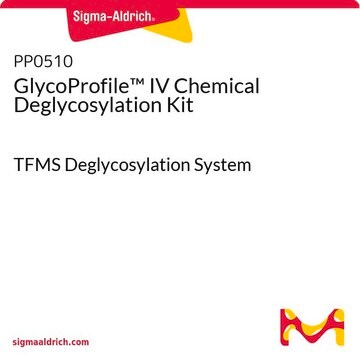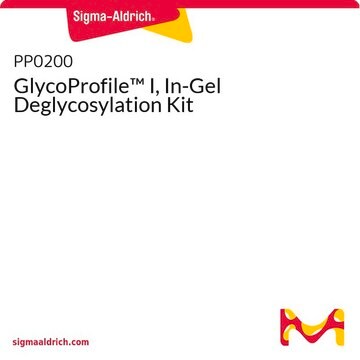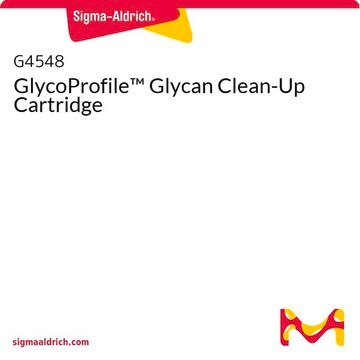362280
Glycoprotein Deglycosylation Kit
Synonym(s):
Deglycosylation kit
Sign Into View Organizational & Contract Pricing
All Photos(1)
About This Item
UNSPSC Code:
41116133
NACRES:
NA.84
Recommended Products
General description
Kit contains all enzymes and reagents needed to remove all N-linked, all simple O-linked, and virtually all-complex O-linked oligosaccharides from glycoproteins in a single reaction at neutral pH. Suitable for use with native or denaturation protocols, with no degradation of protein. This kit has been assembled to contain sequencing grade enzymes without azide, BSA, or glycerol. Each kit can be used to deglycosylate up to 2 mg glycoprotein.
Components
Bovine Fetuin Control, Denaturation Solution, Endo-α-N-Acetylgalactosaminidase, β1,4-Galactosidase, Glucosaminidase, N-Glycosidase F, Neuraminidase, Reaction Buffer, TRITON™ X-100 Detergent, and a user protocol.
Warning
Toxicity: Multiple Toxicity Values, refer to MSDS (O)
Specifications
Assay Time: 3 h-5 days
Other Notes
Chiba, A., et al. 1997. J. Biol. Chem.272, 2156.
Jiang, M.S., and Hart, G.W. 1997. J. Biol. Chem.272, 2421.
Wilkins, P.P., et al. 1996. J. Biol. Chem.271, 18732.
Altmann, F., et al. 1995. Glycoconj. J.12, 84.
Szkudlinski, M.W., et al. 1995.
Endocrinology136, 3325.
Pahlsson, P., et al. 1994. Glycoconj. J.11, 43.
Saito, S., et al. 1994. J. Biol. Chem.269, 5644.
Tarentino, A.L., and Plummer, T.H. 1994. Methods Enzymol.230, 44.
Iwase, H., Hotta, K. 1993. Methods. Mol. Biol.14, 151.
Stults, N.L., and Cummings, R.D. 1993. Glycobiology3, 589.
Hard, K., et al. 1992. Eur. J. Biochem.205, 785.
Kuraya, N., and Hase, S. 1992. J. Biochem. (Tokyo)112, 122.
Trimble, R.B., and Tarentino, A.L. 1991. J. Biol. Chem.266, 1646.
Fukuda, M., et al. 1987. J. Biol. Chem.262, 11952.
Sojar, H.T., and Bahl, O.P. 1987. Arch. Biochem. Biophys.259, 52.
Taga, E.M., et al. 1984. Biochemistry23, 815.
Kobata, A. 1979. Anal. Biochem.100, 1.
Uchida, Y., et al. 1979. J. Biochem (Tokyo)86, 1573.
Glasgow, L.R., et al. 1977. J. Biol. Chem.252, 8615.
Spiro, R.G., and Bhoyroo, V.D. 1974. J. Biol. Chem.249, 5704.
Jiang, M.S., and Hart, G.W. 1997. J. Biol. Chem.272, 2421.
Wilkins, P.P., et al. 1996. J. Biol. Chem.271, 18732.
Altmann, F., et al. 1995. Glycoconj. J.12, 84.
Szkudlinski, M.W., et al. 1995.
Endocrinology136, 3325.
Pahlsson, P., et al. 1994. Glycoconj. J.11, 43.
Saito, S., et al. 1994. J. Biol. Chem.269, 5644.
Tarentino, A.L., and Plummer, T.H. 1994. Methods Enzymol.230, 44.
Iwase, H., Hotta, K. 1993. Methods. Mol. Biol.14, 151.
Stults, N.L., and Cummings, R.D. 1993. Glycobiology3, 589.
Hard, K., et al. 1992. Eur. J. Biochem.205, 785.
Kuraya, N., and Hase, S. 1992. J. Biochem. (Tokyo)112, 122.
Trimble, R.B., and Tarentino, A.L. 1991. J. Biol. Chem.266, 1646.
Fukuda, M., et al. 1987. J. Biol. Chem.262, 11952.
Sojar, H.T., and Bahl, O.P. 1987. Arch. Biochem. Biophys.259, 52.
Taga, E.M., et al. 1984. Biochemistry23, 815.
Kobata, A. 1979. Anal. Biochem.100, 1.
Uchida, Y., et al. 1979. J. Biochem (Tokyo)86, 1573.
Glasgow, L.R., et al. 1977. J. Biol. Chem.252, 8615.
Spiro, R.G., and Bhoyroo, V.D. 1974. J. Biol. Chem.249, 5704.
Due to the nature of the Hazardous Materials in this shipment, additional shipping charges may be applied to your order. Certain sizes may be exempt from the additional hazardous materials shipping charges. Please contact your local sales office for more information regarding these charges.
Legal Information
CALBIOCHEM is a registered trademark of Merck KGaA, Darmstadt, Germany
Triton is a trademark of The Dow Chemical Company or an affiliated company of Dow
Signal Word
Danger
Hazard Statements
Precautionary Statements
Hazard Classifications
Acute Tox. 3 Dermal - Aquatic Acute 1 - Aquatic Chronic 2 - Eye Dam. 1 - Repr. 2 - Skin Irrit. 2 - Skin Sens. 1
Storage Class Code
6.1C - Combustible acute toxic Cat.3 / toxic compounds or compounds which causing chronic effects
Certificates of Analysis (COA)
Search for Certificates of Analysis (COA) by entering the products Lot/Batch Number. Lot and Batch Numbers can be found on a product’s label following the words ‘Lot’ or ‘Batch’.
Already Own This Product?
Find documentation for the products that you have recently purchased in the Document Library.
Christoph Mück et al.
The journals of gerontology. Series A, Biological sciences and medical sciences, 65(11), 1165-1180 (2010-08-03)
Tumor necrosis factor-like cytokine 1A (TL1A) is expressed in endothelial cells and contributes to T-cell activation, via an extracellular fragment TL1A(L72-L251), generated by ectodomain shedding. Fragments of TL1A, referred to as vascular endothelial growth inhibitor, were found to induce growth
A Merkx-Jacques et al.
Journal of bacteriology, 186(8), 2253-2265 (2004-04-03)
flaA1 and wbpB are conserved genes with unknown biological function in Helicobacter pylori. Since both genes are predicted to be involved in lipopolysaccharide (LPS) biosynthesis, flagellum assembly, or protein glycosylation, they could play an important role in the pathogenesis of
Laura E Brown et al.
The Journal of biological chemistry, 291(27), 13926-13942 (2016-04-30)
The establishment of cell-cell contacts between presynaptic GABAergic neurons and their postsynaptic targets initiates the process of GABAergic synapse formation. GABAA receptors (GABAARs), the main postsynaptic receptors for GABA, have been recently demonstrated to act as synaptogenic proteins that can
Xiaoke Yin 殷晓科 et al.
Arteriosclerosis, thrombosis, and vascular biology, 39(9), 1859-1873 (2019-07-19)
Marfan syndrome (MFS) is caused by mutations in FBN1 (fibrillin-1), an extracellular matrix (ECM) component, which is modified post-translationally by glycosylation. This study aimed to characterize the glycoproteome of the aortic ECM from patients with MFS and relate it to
Jason A Wall et al.
American journal of physiology. Heart and circulatory physiology, 291(5), H2462-H2472 (2006-06-13)
Ischemia-reperfusion (I/R) has critical consequences in the heart. Recent studies on the functions of I/R-activated kinases, such as p38 mitogen-activated protein kinase (MAPK), showed that I/R injury is reduced in the hearts of transgenic mice that overexpress the p38 MAPK
Our team of scientists has experience in all areas of research including Life Science, Material Science, Chemical Synthesis, Chromatography, Analytical and many others.
Contact Technical Service









